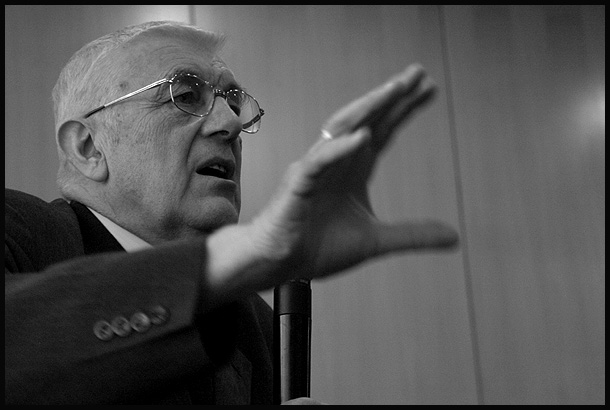 Take a deep breath and come with me as we delve into a mind stuck in the 1930s.
Take a deep breath and come with me as we delve into a mind stuck in the 1930s.‘Jews form ghettoes’….’they settle in our civilizations, preferably among the rich…’
That’s one of the classic lines in a just
released ‘scholarly pamphlet’ you can be sure will be on all Polish school students’ reading lists, any time soon. His son is the present education minister,
Roman Giertych, and the magnificent piece of scholarship is
LPR Member of the European Parliament
Maciej’s rambling ruminations on
Civilizations at war in Europe.
I just read the whole thing. It’s…..er...
Maciej Giertych goes neo-con? No, no, no. This tract is not the product of the pre-Iraq war neo-conservative ‘battle of civilizations’, but back, way back to the 1930s, to nationalist politics frozen in time from 1945 - 1989, now seen staggering around Poland like a man recovering from long Soviet years of frozen animation, into the blinding light of post-Communist Poland.
That was a long sentence, wasn’t it?
Civilizations at war in Europe is based on what Giertych believes was a truly marvelous writer, odd-ball Polish historian Feliks Koneczny, the founder of the so-called ‘comparative science of civilizations’, who died in 1949. It takes in garbled sociology, tongue-tied linguistics, and a bit of 1930s race biology is thrown in for good measure.
Giertych on raceCivilization is a strong marriage barrier. People normally look for a spouse from the same [culture] as their own. They expect to share civilizational norms with the spouse. As a result the covilizational barrier becomes a biological one. In biology animals and humans develop as a consequence of isolation.
In the introductionary passage he seems to use the concept ‘human race’ and the differences between races of animals, synonymously. Whites, Arabs and Africans are, for Giertych, like the biological variations between wild cats and domestic cats.
That’s something mainstream biology gave up decades ago when categorizing humans. Human races – in the plural – is not a biological concept, but a social one.
But no matter, Giertych is not using race to explain the growth of societies – at least not in this essay. Civilizations are not formed from races, he says but from culture.
.
Giertych on CivilizationHe says in the ‘method’ section that the categorization of cultures:
’…will be used hierarchically. Thus within the Latin civilization there are such cultures as British, Spanish, Polish and others. Within the Jewish [civilization] one can find Sephardic, the Hassidim, the Karaim and other cultures.”
Note ‘hierarchically’… But which civilization is on top, we wonder, breathlessly?
He spends rather a long time on trying to demonstrate certain defects in writing expressed in other than the Latin script. He claims that Chinese pictorial writing inhibits abstract thought [?] and that written Hebrew, because it expresses no consonants, leaves ambiguity in meaning[!].
Arabic script, though, is good, because you can scribble it quickly[!!].
Latin civilization (and he uses civilization and culture interchangeably) is the most enduring and successful [shock!] only spoiled if it comes under pressure and does not defend itself from either the outside (historically Byzantine and Turanian cultures, - meaning basically Russia and Germany)
or from Jews from within.
It’s a Rip van Winkle world view in a 1930s rain coat. And there is a hole in his sock.
Giertych has a coded go at Law and Justice. He fights his long dead 1930s nationalist dad’s battles for him, saying that Pilsudski-ites, followers of Marshall
Jozef Pilsudski – and arch enemy of Giertych’s nationalist idol
Roman Dmowski - were characteristic of the Russian and German cultures, in their preferred political system of a strong leader, leaving decision making to the higher-ups. That’s why they went along, as the Dmowski nationalists did not, with the Pilsudski led coup of 1926.
It’s a historical reference with a contemporary inference: the present Law and Justice led coalition government – of which Giertych’s League of Polish Families is part – consider themselves ‘Pilsudski-ites’.
Giertych’s whole view of today is informed by the nationalist struggles of the past. By bringing up Pilsudski as some kind of example of how Byzantine strong leader culture had infiltrated Poland’s ‘Latin’ culture, he is back fighting the inter-war struggle between the nationalist Endecja movement and the Sanacja government, filled with Pilsudski-ites.
Come on Maciej, isn’t it time to move on, old boy?
Giertych on JewsJews are not a race. So, logically, he says, almost proudly, “It’s a mistake to think that anti-Semitism is racism”.
Er….
“We [Poles] consider the Jewish people today as a tragic community, a people that has not recognized the time of its visitation,’ he says.
The real problem with these people, writes Giertych, is that they are still waiting for the messiah, when everyone knows he turned up 2000 years ago in Jerusalem. Jews have suffered for this religious blindness ever since.
The cultures that recognized Christ flourished, but the Jews did not, and:
‘…became wanderers, jealously nurturing their Chosenness, this messianic consciousness, which gives a defining mark to their [culture].'
The essay really starts to pick up speed now, and it all just comes tumbling out.
On intercultural relationsCultures – civilizations – must remain separate, otherwise they weaken.
This is why a Jew cannot be a Pole. Neither can Gypsies.
“Can a Gipsy become a Pole? Though [sharing the same language and religion] I think most Poles would tell you, and most Gypsies, that no, they cannot.’
After a brief detour into the Arabs (they are coming to get us, you know) he concludes:
‘…differentiate civilizations are mutually exclusive. Integration, middle ground, the ‘melting pot’ are not possible.'....The war between civilizations will be fought in the schools. Who will have the greatest influence on the minds of the young? Who will education our children?
He then makes a little detour back, way back, into his family’s past, to a golden age when men were men and women did what they were told. He bizarrely accuses the work of Polish Nobel prize winning author Wladyslaw Reymont of exhibiting un-Polish, un-Latin, elements.
‘In 1925 my grandfather forbade my mother of a standard text in her school, Chlopi, by Wladyslaw Reymont, because he considered it had immodest content. The whole class read it, but my mother did not…she never did read the book.
Which European school today would respect such a wish….?'
Giertych’s essay is a hymn to the ‘Latin culture’ and how it should defend itself against the invasion of other cultures; divorce, homosexuality, abortion and the EU are all symptoms of this creeping occupation. Poles, with a higher sense of national identity, have a lot to teach other Europeans, if we are to won the war of civilizations.
and so it goes on...and on...It's a pamphlet that should not be put on the shelves of the national library, but the natural history museum, where it belongs.
Maciej Giertych’s diatribe to the dinosaurs, which, in its richness and modernity, and it’s breaking of intellectual barriers, will be poured over by scholars for years, is
here. Do not read just before bedtime.




















